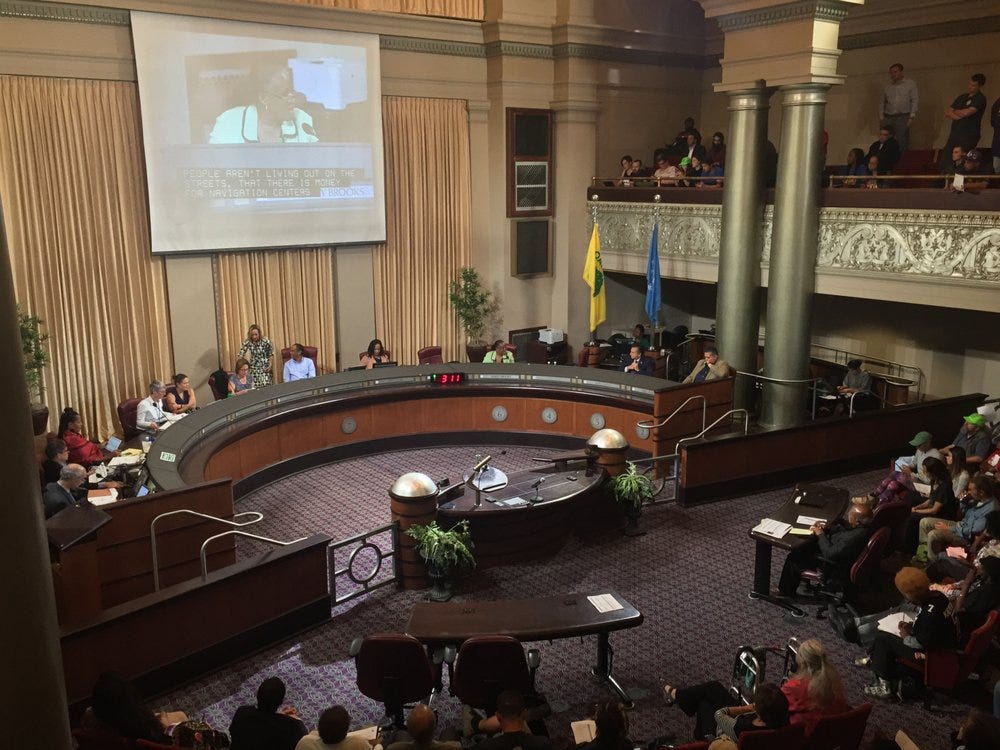2022 EAST BAY ELECTION PREVIEW: Oakland leads six other East Bay mayoral races this year
It’s been almost 24 years, since Rep. Ron Dellums announced he was leaving Congress. Barbara Lee jumped from the state Senate to replace Dellums and the great merry-go-round of 1998-99 began. Don Perata moved from the Assembly in a special election to replace Lee in state Senate. In an upset that still confounds many, Audie Bock, a unknown Green Party candidate, ascended to the state Assembly as her opponents comedically stumbled. All the races were plagued by low-turnout. It was a wild election cycle that many who were not around, like myself, wished to have experienced. The 2022 election cycle will lack the large number of unknown variables that highlighted the 1998-99 cycle, but maintain the extraordinarily amount of political opportunism we will witness over the course of this year. Here is the rest of the most interesting East Bay races to watch in 2022 (Nos. 1-3: Alameda County district attorney, Alameda County sheriff-coroner, and Alameda County Supervisor, District 3):
4. SEVEN MAYORAL RACES LED BY OAKLAND

A changing of the guard could occur in several Alameda County cities this November. None will be more sought-after than the Oakland mayor’s office. Oakland Mayor Libby Schaaf is termed out at the end of this year and three current members of the City Council are in line to replace her. Oakland Councilmembers Sheng Thao, Loren Taylor, and Treva Reid make up the current top-tier of candidates. All three have limited experience. Thao and Taylor are nearing the conclusion of their first term on the council, and Reid was elected in 2020. For Schaaf, her legacy is indirectly on the ballot. Will voters care who she endorses? How will the candidates portray her almost eight years in office? Will it focus on the downtown building boom that occurred, along with the hopes of the Howard Terminal ballpark project, or will rampant crime and homelessness during her time in office be front and center? Currently, 11 candidates have filed statements of intent to run for mayor, including former Councilmember Ignacio De La Fuente and Derreck Johnson, who unsuccessfully ran in 2020 for the at-large seat against Rebecca Kaplan. The pair make up a second-tier of candidates that is likely to grow over the next few months. Look for the campaign to be dominated by public safety issues just it has for every two-year cycle in Oakland politics.
—Like Oakland, San Leandro and Hayward will have new mayors. San Leandro Mayor Pauline Russo Cutter is also termed out and Hayward Mayor Barbara Halliday announced last fall that she will not seek re-election. San Leandro Councilmember Bryan Azevedo is vying for the job after just a year in office, and Councilmember Corina Lopez is likely to join the race and become the early frontrunner. Former San Leandro Councilmember Lee Thomas is also in the race. In Hayward, Councilmember Mark Salinas has already filed to replace Halliday. The opportunity to lead the Heart of the Bay would seem to be a big opportunity, but not only has no other candidate filed, none are even rumored to be showing interest. Keep an eye on Councilmember Elisa Marquez, who would seem to be a good fit in a city with more than 40 percent Latino representation.
—Voters in Alameda, Dublin, Newark, and Pleasanton will also have mayor’s races to decide in November. Incumbents are featured in each race. However, Dublin could become an open seat if Mayor Melissa Hernandez runs for the vacant 20th Assembly District seat and either wins the June primary or finishes second.
—One other item of note: Of the seven mayoral races on the ballot in Alameda County next November, all, but one, are currently held by women. Marilyn Ezzy Ashcraft in Alameda; Hernandez in Dublin; Halliday in Hayward; Schaaf in Oakland, Karla Brown in Pleasanton; and Cutter in San Leandro. Only the venerable Mayor Al Nagy in Newark is male. Whether this gender ratio continues is something to watch next fall.
5. 20TH ASSEMBLY DISTRICT

Assemblymember Bill Quirk bowed out last month after serving the district since 2012. Redistricting has added new areas to the 20th Assembly District, including Dublin, perhaps an up-and-coming political center of Alameda County political in the future. Rep. Eric Swalwell was a Dublin councilmember and Alameda County Supervisor David Haubert was a Dublin mayor. Might the next assemblymember be toiling on the Dublin City Council? Dublin Mayor Melissa Hernandez and Councilmember Shawn Kumagai are both seriously contemplating campaigns for the June primary. Hernandez ran a spirited campaign for county supervisor in 2020 and Kumagai is best known countywide for leading the ultimately controversial push to raise the LGBT Pride over Dublin City Hall. Hernandez and Kumagai are both viewed as moderates under the East Bay’s definition of the political spectrum and well-received by various labor groups. The inclusion of Alameda Labor Council Secretary-Treasurer Liz Ortega-Toro could scramble the entire calculus of this race when it comes to the all-important organized labor angle. The current field could pose problems for Hernandez both geographically and demographically. Two Dublin officials on the ballot could split up hometown support and if Ortega-Toro chooses to highlight her background as an undocumented child, it could erode Latino support. If former San Leandro Councilmember Ed Hernandez joins the race, then there would be two candidates with the same surname! However, this race will be won in Sacramento through Independent Expenditure Committees. For progressives in Sacramento, the 20th Assembly District is showing an inclination toward being ripe for a moderate to win. A new member of the capitol’s Mod Squad could further hinder the type of legislation that progressives crave to pass in Sacramento.
6. 10TH STATE SENATE DISTRICT

State Sen. Bob Wieckowski is termed out of office and the current iteration of the 10th State Senate District will slightly shift further into Silicon Valley. Will the new district, which omits unincorporated Alameda County in the northern portion, and now include more of North San Jose, Santa Clara, and Sunnyvale, affect the chances of East Bay candidates? Hayward Councilmember Aisha Wahab and Fremont Mayor Lily Mei hope not. The pair are currently the overwhelming favorites to replace Wieckowski in Sacramento. Wahab and Mei both came out of the gate last year with impressive early fundraising tallies in the neighborhood of $300,000. That type of money coming from somewhat differing pots of fundraising might signal to other prospective challengers that few avenues for raising large amounts of contributions really exist. Unless a credible candidate emerges from the South Bay, expect Wahab and Mei to battle it out past the June primary. Two big questions will highlight this race. Is the new SD10 progressive enough for Wahab to win and is expected Asian American support a monolith for Mei? Wahab is viewed as a rising star in Alameda County politics for many reason, especially her superior ability as a public speaker and her grasp of the issues on the fly. Mei, meanwhile, is often flat and lacks specifics. But that clear advantage for Wahab could be erased if the pandemic continues to limit public appearances in lieu of Zoom forums and canned responses to questions. Labor will support Wahab and moderate and right-leaning special interests will support Mei. Last fall, the Alameda County Democratic Party set a precedent by officially admonishing Mei for past anti-LGBT comments and actions. The move may ultimately be a mere a sideshow to tabloid-level stories to come.
7. CITY COUNCIL CLASHES

—TOWN COUNCIL IN FLUX—Just like in the mayors’ races, the Oakland City Council takes top billing among notable council races. This election cycle should have been a moribund campaign in which three freshman councilmembers were headed to certain re-election, but aspirations for higher office are taking precedence. Councilmembers Sheng Thao (District 4) and Loren Taylor (District 6) want to be mayor. Councilmember Nikki Fortunato Bas (District 2) is a lock for re-election, but it wouldn’t be surprising if she seeks to replace Wilma Chan on the Alameda County Board of Supervisors. Bas could run for county supervisor and if she doesn’t succeed in the June primary, she could still run for her council seat in November. Uncertainty over whether these candidates will actually go through with running for higher office appears to be stifling interest in their seat in the early going. The only well-known candidate showing interest is Janani Ramachandran, the political newcomer who surprised many by a strong showing in last year’s 18th Assembly District special election. Ramachandran filed an intent to run for Thao’s District 4 council seat.
—Neighboring San Leandro will have two open seats available after Councilmembers Deborah Cox (District 1) and Corina Lopez (District 6) are termed out of office. Over the past two years, the San Leandro City Council has drifted toward a brand of progressivism that has appeared aimless and filled with platitudes. Few people bother to run for public office in San Leandro, so don’t expect much to choose from. In District 1, David Anderson, a previous candidate for the seat, is in the race that also includes Celina Reynes. She contributed to San Leandro Councilmember Victor Aguilar, Jr.’s campaign last year in the 18th Assembly District special election, and received positive reviews when she filled in at candidate forums for the absent candidate. Aguilar, Jr. is also up for re-election, although some still believe he may run for mayor. If not, don’t be surprised if he runs unopposed for his council seat. In addition, it’s possible that only a single candidate will run for Lopez’s District 6 seat. The same scenario happened in 2016 when Councilmember Pete Ballew won the open seat by default because he was the only candidate to file.
—Hayward Councilmember Sara Lamnin is up for re-election and if Councilmember Aisha Wahab does not seek re-election, a second at-large seat will become available.
—In Alameda, Councilmembers John Knox White and Tony Daysog—representing differing sides of the city’s electorate—will be on the ballot in November.
—Livermore and Union City will continue their shift to district-based election in November.
—Incumbents in Berkeley and Fremont are all expected to face limited challenges in the fall.




